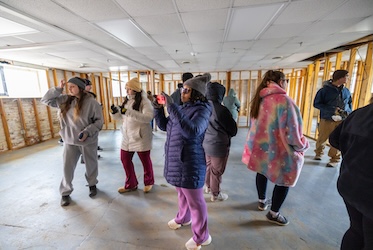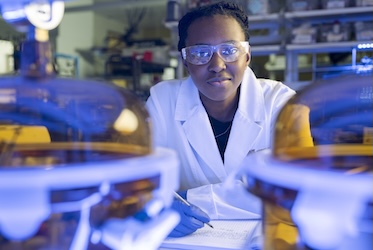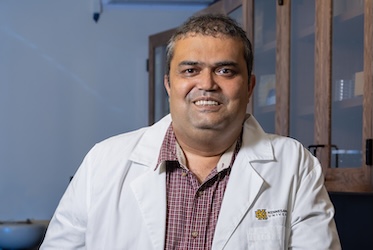
Kennesaw State research team looks to expand mushroom production range
KENNESAW, Ga. | Nov 29, 2021
Demand for culinary mushrooms in Georgia and the wider region is far higher than supply, leaving both home cooks and chefs wanting. Mushroom-growing technology developed at Kennesaw State University could be poised to change that.
“There is about an eight times greater demand for mushrooms than the supply available in the Southeast, so there is definitely room for a market here in Georgia,” KSU researcher Kyle Gabriel said. “Our research seeks to help local growers meet that demand.”

Kennesaw State’s lead researcher on mushroom production, Chris Cornelison, and his team recently received funding from the Georgia Department of Agriculture to bring automated mushroom production technology to four mushroom growers in Dahlonega, Dalton, Ellijay, and Gainesville. The $102,000, three-year award comes from the Specialty Crop Block Grant Program, coordinated by the U.S. Department of Agriculture to boost competitiveness of specialty agricultural products, such as culinary mushrooms, across the nation.
The central focus of the technology is a prototype mushroom cultivation chamber fabricated in a 40-foot shipping container with systems to automatically regulate the growing conditions. The mushrooms grow on recycled agricultural materials, such as pecan shells, corn chaff and spent brewing grains.
The cultivation chambers will be fabricated at Kennesaw State University, where the growers will be trained to use them before the units are then transported to their mushroom farms.
Cornelison said the intent is to create a compact, affordable alternative to conventional agricultural methods, which typically involve large plots of land and unpredictable growing conditions. Beyond the system providing more consistent harvests and yields, he said, such innovation will also make Georgia a more competitive state in the mushroom cultivation market and more able to meet consumer demand.

Pennsylvania is the nation’s top mushroom producer, and Gabriel said the distance required to bring the mushrooms to the Southeast can result in significant amounts of spoiled product after reaching their destination.
Their project began when Cornelison and Gabriel received their first Specialty Crop Block grant in 2017, after noticing the scarcity of commercial mushroom growers in Georgia and the Southeast as a whole. They used that funding to design a mushroom cultivation chamber within a used shipping container and developed embedded systems to control temperature, humidity and carbon dioxide.
“Despite how straightforward mushroom cultivation can be, it is not widely practiced in many communities,” Cornelison said. “The vast majority of all mushrooms in the U.S. are grown in very few locations, usually in the Northeast. That isn’t a very suitable solution considering how an embedded system and controlled environments allow for such mushrooms to grow in facilities across the country.”
Other benefits of the team’s prototype, currently housed at the KSU Field Station, are mobility, versatility and accessibility, as it can be placed on any available plot of land, including parking lots.
“Traditional agriculture requires acres of land to produce a certain amount of food to remain profitable,” said graduate student William Beeson, who is pursuing a master’s degree in integrative biology. “These shipping containers can be profitable due to low start-up costs and taking up much less space. You can easily put them almost anywhere, especially if you consider using solar panels to power them.”

The deployment of the containers is possible because of the help of the Georgia Research Alliance (GRA), which provides universities seed funds and access to mentors and consultants in forming companies related to their research. The team received $18,000 in matching funds from the GRA’s venture development program to assist in purchasing, preparing and distributing the containers to commercial growers.
This is the second time the Kennesaw State research team has received funding from GRA. The first $25,000 was awarded last year to study commercialization of growing mushrooms using regional agricultural wastes. KSU is also one of two institutions to participate in GRA’s inaugural Greater Yield Initiative, which supports university start-up companies focused on agricultural and food technology.
“We have a good team working on this project, and we’re very grateful for the continued support from the Georgia Department of Agriculture and the Georgia Research Alliance,” Cornelison said. “We’re glad that they keep us going, and we are excited to see where this project will take us next.”
— Jacob Segura
Related Stories

Kennesaw State architecture, engineering students reimagine Asheville's devastated River Arts District

First-year Kennesaw State student, author recognized as versed local historian

Chemistry student engaged in sustainable catalyst research through Kennesaw State's First-Year Scholars program

Kennesaw State researchers awarded Department of Energy grant to investigate materials that boost energy-efficient technologies
A leader in innovative teaching and learning, Kennesaw State University offers undergraduate, graduate, and doctoral degrees to its more than 47,000 students. Kennesaw State is a member of the University System of Georgia with 11 academic colleges. The university’s vibrant campus culture, diverse population, strong global ties, and entrepreneurial spirit draw students from throughout the country and the world. Kennesaw State is a Carnegie-designated doctoral research institution (R2), placing it among an elite group of only 8 percent of U.S. colleges and universities with an R1 or R2 status. For more information, visit kennesaw.edu.















